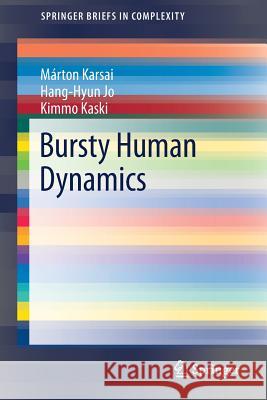Bursty Human Dynamics » książka



Bursty Human Dynamics
ISBN-13: 9783319685380 / Angielski / Miękka / 2017 / 121 str.
Bursty Human Dynamics
ISBN-13: 9783319685380 / Angielski / Miękka / 2017 / 121 str.
(netto: 210,83 VAT: 5%)
Najniższa cena z 30 dni: 212,02
ok. 16-18 dni roboczych.
Darmowa dostawa!
This book provides a comprehensive overview on emergent bursty patterns in the dynamics of human behaviour.
1. Introduction.- 2. Measures and characterisations.- 3. Empirical findings in human bursty dynamics.- 4. Models and mechanicsms of bursty behaviour.- 5. Dynamical processes on bursty systems.- 6. Discussion.
Márton Karsai is an Assistant Professor with INRIA research chair in Computer Science at the École Normale Supérieure de Lyon (France), member of IXXI Complex System Institute and the Laboratoire de l'Informatique du Parallélisme. He left the Béla Bartók Conservatory in Budapest (Hungary) in 2000 and received his MSc degree in 2005 in Computational Physics at the University of Szeged (Hungary). He obtained co-supervised PhD degrees in 2009 from the University of Szeged and CNRS - Université Joseph Fourier (France). He has been a postdoctoral fellow at Aalto University (Finland) and Northeastern University (USA). He is a lecturer at Collegio Carlo Alberto (Italy), visiting scientist at Aalto University (Finland), member of the Complex System and the Network Science Societies, and an editorial board member of the journal of Advances in Complex Systems (Word Scientific). His research interest falls within Human Dynamics, Computational Social Science, and Data Science, especially focusing on heterogeneous temporal dynamics, spatial and temporal networks, and social contagion phenomena. His main expertise are in analysing large human interaction datasets and in the development of data-driven models of various social phenomena.
Hang-Hyun Jo is currently a Junior Research Group Leader/Professor at Asia Pacific Center for Theoretical Physics (Republic of Korea). He received his MSc (2001) and PhD (2006) in Statistical Physics at Korea Advanced Institute of Science and Technology. He has previously been a Research Fellow at Korea institute for Advanced Study, a Postdoctoral Researcher at Aalto university (Finland), and a Research Professor at Pohang University of Science and Technology (Republic of Korea). He was awarded Yong-Bong Prize by The Korean Physical Society in 2017 as his achievements in statistical physics were recognized. His research interests cover various topics in statistical physics, complex systems, and computational social science, including complex networks and bursty dynamics.
Kimmo Kaski, is Full Professor of Computational Science at Aalto University School of Science (Finland), Supernumerary Fellow of Wolfson College of Oxford University and Associate Fellow of Said Business School of Oxford University (UK), and External Faculty member of Complexity Science Hub Vienna (Austria). He received his MSc in Electrical Engineering at Helsinki University of Technology and obtained his D.Phil. degree in Theoretical Physics at University of Oxford. He has been as Academy Professor of the Academy of Finland for two five-year terms, as the Director of Centre of Excellence in Computational Science for two six year terms as well as Professor at Temple University in Philadelphia (USA) and at Tampere University of Technology (Finland) together with having held fixed-term professorial positions at Southern Illinois University (USA) and Oxford University. He is a Fellow of American Physical Society, Institute of Physics (Chartered Physicist), Academia Europeae, Finnish Academy of Science and Letters, and Technology Academy of Finland. In research he has a broad experience in Computational Science, Statistical Physics, Computer Science and Technology, Econophysics, Complex Systems and Networks, Data Science, and Computational Social Science focusing currently on complexities of physical, biological, economic, techno-social, and societal systems, in which areas he has authored nearly 500 publications in various scientific periodicals.
This book provides a comprehensive overview on emergent bursty patterns in the dynamics of human behaviour. It presents common and alternative understanding of the investigated phenomena, and points out open questions worthy of further investigations.
The book is structured as follows. In the introduction the authors discuss the motivation of the field, describe bursty phenomena in case of human behaviour, and relate it to other disciplines. The second chapter addresses the measures commonly used to characterise heterogeneous signals, bursty human dynamics, temporal paths, and correlated behaviour. These definitions are first introduced to set the basis for the discussion of the third chapter about the observations of bursty human patterns in the dynamics of individuals, dyadic interactions, and collective behaviour. The subsequent fourth chapter discusses the models of bursty human dynamics. Various mechanisms have been proposed about the source of the heterogeneities in human dynamics, which leads to the introduction of conceptually different modelling approaches. The authors address all of these perspectives objectively, highlight their strengths and shortcomings, and mention possible extensions to them. The fifth chapter addresses the effect of individual heterogeneous behaviour on collective dynamics. This question in particular has been investigated in various systems including spreading phenomena, random walks, and opinion formation dynamics. Here the main issues are whether burstiness speeds up or slows down the co-evolving processes, and how burstiness modifies time-dependent paths in the system that determine the spreading patterns of any kind of information or influence. Finally in the sixth chapter the authors end the review with a discussion and future perspectives.
It is an ideal book for researchers and students who wish to enter the field of bursty human dynamics or want to expand their knowledge on such phenomena.1997-2026 DolnySlask.com Agencja Internetowa
KrainaKsiazek.PL - Księgarnia Internetowa









